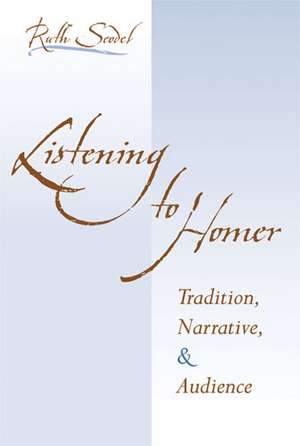Listening to Homer: Tradition, Narrative, and Audience
Autor Ruth Scodelen Limba Engleză Paperback – 2 iun 2009
The Homeric poems were not intended for readers, but for a listening audience. Traditional in their basic elements, the stories were learned by oral poets from earlier poets and recreated at every performance. Individual nuances, tailored to the audience, could creep into the stories of the Greek heroes on each and every occasion when a bard recited the epics.
For a particular audience at a particular moment, "tradition" is what it believes it has inherited from the past--and it may not be particularly old. The boundaries between the traditional and the innovative may become blurry and indistinct. By rethinking tradition, we can see Homer's methods and concerns in a new light. The Homeric poet is not naive. He must convince his audience that the story is true. He must therefore seem disinterested, unconcerned with promoting anyone's interests. The poet speaks as if everything he says is merely the repetition of old tales. Yet he carefully ensures that even someone who knows only a minimal amount about the ancient heroes can follow and enjoy the performance, while someone who knows many stories will not remember inappropriate ones. Pretending that every detail is already familiar, the poet heightens suspense and implies that ordinary people are the real judges of great heroes.
Listening to Homer transcends present controversies about Homeric tradition and invention by rethinking how tradition functions. Focusing on reception rather than on composition, Ruth Scodel argues that an audience would only rarely succeed in identifying narrative innovation. Homeric narrative relies on a traditionalizing, inclusive rhetoric that denies the innovation of the oral performance while providing enough information to make the epics intelligible to audiences for whom much of the material is new.
Listening to Homer will be of interest to general classicists, as well as to those specializing in Greek epic and narrative performance. Its wide breadth and scope will also appeal to those non-classicists interested in the nature of oral performance.
Ruth Scodel is Professor of Greek and Latin, University of Michigan, and former president of the American Philological Association.
"Ruth Scodel's Listening to Homer proves it is still possible to explore the workings of epic without recourse to a battery of jargon or technicalities. This is not a 'one big idea' book but a rich . . . set of reflections; it makes refreshing reading . . . ."
---Greece & Rome
---Greece & Rome
"This is an important book, putting the receiving rather than the sending side of the performance of the Homeric epics center stage. The many observations on narrative technique are often new and worthwhile."
---Irene J.F. de Jong, Gnomon
---Irene J.F. de Jong, Gnomon
Preț: 171.98 lei
Nou
Puncte Express: 258
Preț estimativ în valută:
32.91€ • 33.95$ • 27.46£
32.91€ • 33.95$ • 27.46£
Carte indisponibilă temporar
Doresc să fiu notificat când acest titlu va fi disponibil:
Se trimite...
Preluare comenzi: 021 569.72.76
Specificații
ISBN-13: 9780472033744
ISBN-10: 0472033743
Pagini: 248
Dimensiuni: 152 x 229 x 18 mm
Greutate: 0.4 kg
Editura: UNIVERSITY OF MICHIGAN PRESS
Colecția University of Michigan Press
ISBN-10: 0472033743
Pagini: 248
Dimensiuni: 152 x 229 x 18 mm
Greutate: 0.4 kg
Editura: UNIVERSITY OF MICHIGAN PRESS
Colecția University of Michigan Press
Recenzii
"Ruth Scodel's Listening to Homer proves it is still possible to explore the workings of epic without recourse to a battery of jargon or technicalities. This is not a 'one big idea' book but a rich . . . set of reflections; it makes refreshing reading . . . ."
---Greece Rome
"This is an important book, putting hte receiving rather than the sending side of the performance of the Homeric epics centre stage. Scodel's radical position concerning the prior knowledge of the authorial audience...The many observations on narrative technique which she bases on this position are often new and worthwhile."
---Irene J.F. de Jong, Gnomonthe
---Greece Rome
"This is an important book, putting hte receiving rather than the sending side of the performance of the Homeric epics centre stage. Scodel's radical position concerning the prior knowledge of the authorial audience...The many observations on narrative technique which she bases on this position are often new and worthwhile."
---Irene J.F. de Jong, Gnomonthe
Descriere
A discussion of how ancient Greek bards ensured that their poetry would reach audiences of various backgrounds
